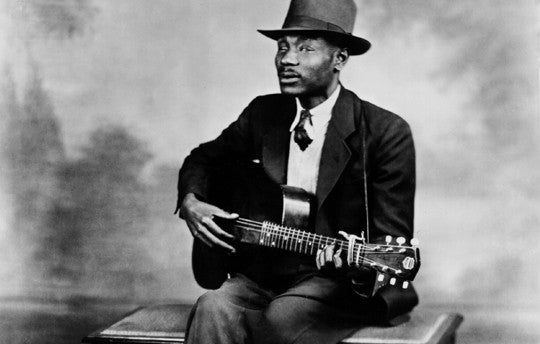Your Cart is Empty

World Music Network is pleased to announce the addition of two compilation albums to our Jazz & Blues Legends series. The Rough Guide To Unsung Heroes Of Country Blues and The Rough Guide To Blues Legends: Blind Boy Fuller can be purchased as a one-off, or as part of our subscription service.
This album brings to the fore classic early blues masterpieces that deserve to be heard and allows the limelight to fall on some of the lesser-known country blues masters. Essential listening for any blues connoisseur, this is an adventure into some of the more hidden recesses of country blues.
Listen to the album or order it here
Very little is known about many of these featured early blues artists, other than the simple fact that their classic recordings are like arrows through time and have a cutting edge coolness which defies the age in which they were recorded. These tracks are essential listening for any blues connoisseur, and an adventure into some of the more hidden recesses of country blues.
There is no space for the likes of Charley Patton, Robert Johnson or Son House in this roll of honour, as it’s time for the usual suspects to stand aside and let the limelight fall on some of the lesser-known country blues masters, whose brilliance has always been slightly under the radar. This handpicked selection of beautifully re-mastered tracks ranks alongside anything by the more decorated blues greats of the time, and delves that bit deeper into the early origins of the genre. Far from being a best of the rest, this album brings to the fore classic masterpieces that need to be heard.
Aside from the much reduced crackle and hiss synonymous with old country blues recordings, it is hard to believe that all of these tracks date from the late 1920s/early 1930s, as they have an evergreen quality and emotional depth quite unlike anything else recorded at this time in history. These precious recordings will hopefully open your ears to some of the often overlooked & greatest blues pioneers of their day.
During his short but prolific recording career, Blind Boy Fuller became one of the most influential and best-selling bluesmen of his time. With songs brimming with wit and soulfulness, his strikingly original and energetic guitar arrangements have been an inspiration to countless guitarists ever since.
Listen to the album or order it here
Blind Boy Fuller was only 33 when he died, but during his short but prolific recording career he became one of the most influential and best-selling bluesmen of the pre-War period. Inspired by the legendary blues and evangelist guitarist Rev Gary Davis, Fuller developed a ragtime influenced fingerstyle guitar technique typical among East Coast bluesmen, which beautifully complimented his gritty and expressive voice. Armed with his steel National resonator guitar, Fuller had a huge repertoire of songs ranging from ragtime, hokum and traditional blues to gospel and other popular tunes of the time.
Born Fulton Allen in rural North Carolina on 10 July 1907, he was one of ten children and had a very poor and tough upbringing. As a boy learning to play the guitar, he was influenced by the region’s rich and varied musical traditions, and eventually started plying his trade on street corners and other hang-outs where the African-Americans in the area worked. The life of the street performer was forced upon him when during his mid-teens he began to lose his eyesight and playing the guitar and singing became the only way that he could make a decent living.
Fuller went on to record over 120 songs for a variety of labels ranging from his big selling up-tempo rag ‘Step It Up and Go’, and hokum classics ‘Get Your Yas Yas Out’ and ‘Truckin’ My Blues Away’, to soulful blues numbers like ‘Lost Lover Blues’, all of which are featured on this album.
When people say that blues singers in the 1930s sounded the same, they forget about the music of Blind Foy Fuller which is brimming with wit and soulfulness. The unique sound of his National steel guitar gave voice to his strikingly original and energetic guitar arrangements, which have been an inspiration to countless guitarists ever since. In a similar way to Robert Johnson in the Delta, Blind Boy Fuller was able to bring together the many different styles of the Piedmont region and serve them up in a way that encapsulates the essence of the East Coast blues.